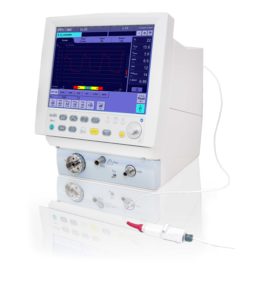CLAC: CLOSED-LOOP AUTOMATIC OXYGEN CONTROL
The manual regulation of inspiratory oxygen (FiO2 ) used to supply oxygen to premature infants, is often complicated and time-consuming. In collaboration (1) between Tübingen University Hospital and the Medical & Technical University of Vienna, a special algorithm was developed to automate the oxygen control provided to premature infants (CLAC: Closed-Loop Automatic Oxygen Control). Löwenstein Medical were able to validate these experiment results in a multicenter study (1) using the Leoni plus in daily hospital operations. In order to make the CLAC controller operation as easy and intuitive as possible for the user, the algorithm control and pulse oximetry measurement were integrated into the Leoni plus (2). The entire operation, including the measured data visualization and the alarm settings, is made over the respirator user interface. At a glance, the user can determine the current graphically displayed status of the patient. CLAC takes the routine adjustment of the inspiratory oxygen (FiO2) in inspiratory gas off the clinician‘s shoulders by constantly monitoring the demand and condition of the patient in adapting the equipment settings accordingly. Thus, the user is relieved of the routine tasks. The user has the possibility to switch off the automatic control at any time in order to regulate the oxygen content manually. „CLAC may improve oxygen administration to preterm infants receiving mechanical ventilation or nasal continuous positive airway pressure while reducing workload related to RMC. (Pediatrics 2014;133:e379–e385)“ (1).
Löwenstein Medical selected Masimo SET (Signal Extraction Technology), because of ”best-in class” SpO2 algorithm performance, ensuring reliable readings under challenging monitoring conditions (low perfusion and movement artifact), which is essential for the functionality of the CLAC Option.


1 Closed-Loop Automatic Oxygen Control (CLAC) in Preterm Infants: A Randomized Controlled Trial, Hallenberger, et al., on behalf of the CLAC Study Group Pediatrics peds. 2013-1834
2 Optional function, which can be ordered in addition